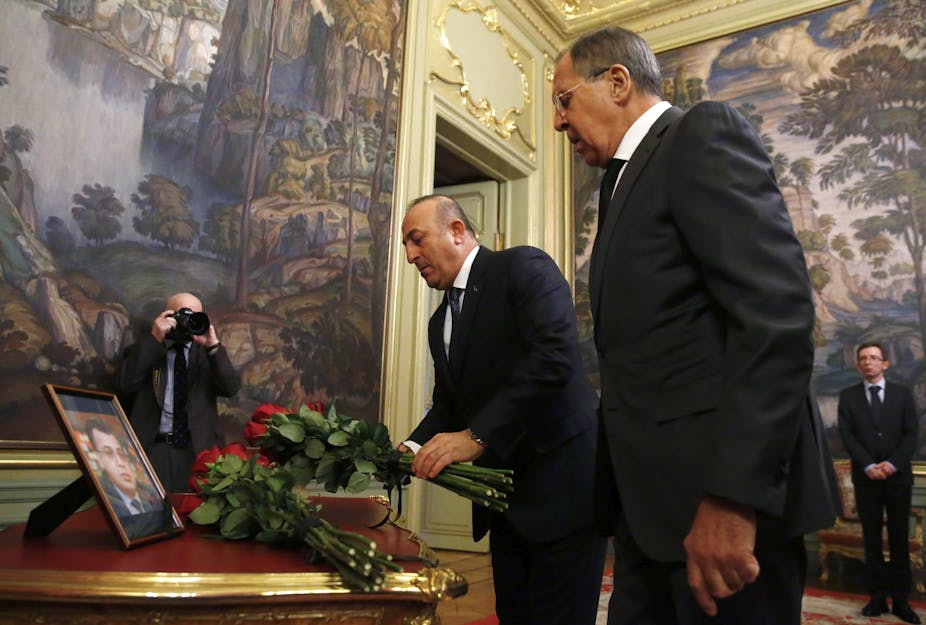The latest victim of Turkey’s climate of insecurity is Andrey Karlov, the Russian ambassador to Turkey.
Karlov was assassinated Dec. 19 by a 22-year-old police officer. Disguised as a security guard in a black suit, the gunman stood behind Karlov as the ambassador was speaking in an art gallery just yards from the U.S. embassy.
“Don’t forget Aleppo! Don’t forget Syria!” he shouted as he pulled the trigger.
Karlov’s death will have consequences reaching far beyond Ankara.
Following the terrorist attack at Istanbul’s Ataturk airport in June 2016, I explained Turkey’s foreign policy sins and argued that Turkey’s row with Russia over Syria was one of them.
Let’s consider what the ambassador’s assassination could mean for ongoing efforts by Turkey and Russia to repair that strained relationship.
What happens in Syria
To understand the latest tensions between Turkey and Russia, look to war-torn Syria, where the two countries have clashed.
Since the start of the Syrian unrest in 2011, Turkey has supported a gamut of rebel elements ranging from the Free Syrian Army to Jabhat al-Nusra to – allegedly – the Islamic State to topple Bashar al-Assad. At that time, the Syrian president was on good terms with then-Turkish Prime Minister Recep Tayyip Erdogan. Their relations soured when Assad began to brutally repress civilian demonstrators inspired by the Arab Spring uprisings elsewhere.
Russia, on the other hand, still supports the Assad regime. So do Iran and Lebanese Hezbollah. The conflict is a sectarian clash, but it is also an opportunity for regional powerhouse Russia to assert control. With the help of Iran, Syria and the lack of a U.S. presence, Russia is exploiting the power vacuum in the neighborhood.
When Turkey downed a Russian warplane near the Syrian border in November 2015, it was not only an attempt to make space for the rebels on the ground but also a show of force to undercut Russian influence in Turkey’s backyard.
Predictably, Turkey’s belligerence backfired. Imposing bans on trade and tourism, Putin delivered a powerful punch to Turkey’s economy. Paralyzed in Syria and constrained by the economic situation at home, President Erdogan formally apologized to the Russian leader in June.
The thawing of the crisis continued in July. When factions in the Turkish military staged a coup to remove Erdogan, the Russian leader was the first to condemn the failed takeover attempt and stand beside his counterpart. Meanwhile, the U.S. and Europe were urging restraint and respect for the rights of those involved in the coup attempt. Not the best way to support Turkish democracy, Erdogan scolded. Putin did not have to lift a finger to pull Turkey closer.
The apology also cleared the way for Turkey’s ground offensive, Operation Euphrates Shield, which began in August. The operation has removed IS from Turkey’s border region with Syria. It also seeks to stop the Syrian Kurds from expanding their presence in northern Syria, where Turkey’s security interests lie.
Russia’s shadow on the operation remains undeniable, however. Erdogan said on Nov. 29 that Turkey entered Syria to “end Assad’s rule.” He revised his remarks two days later, stressing that “the aim of the Euphrates Shield operation is against terror, not against anyone or any country.” Reports suggest that it was the Kremlin’s reaction that caused the change in rhetoric.
Russia continues to tip the balance in favor of Assad. Aleppo, which was once Syria’s biggest city, has long been a haven for the rebels. The ongoing battle for the city took a new turn in November when the Russian-backed Syrian offensive began to purge the rebel forces. Turkey, a long-time supporter of the rebels, is currently part of a triad with Russia and Iran to bring the conflict to an end. Yet its role is currently limited to assisting efforts to evacuate civilians and rebels from the devastated city.

The gunman’s final words before he was shot on the scene suggest he was outraged by this Russian devastation in Syria. We may never know if he was a lone wolf influenced by the recent public outcry in Turkey regarding the carnage in Aleppo.
The fallout
Andrey Karlov’s death is more than a glaring display of Turkey’s incapacitated security and intelligence apparatus. It is a diplomatic fiasco that the Russian administration will make sure to milk to the fullest. This does not mean that Putin will publicly shame and denigrate Turkey. Rather, Russia will use this fiasco to diminish Turkey’s influence in Syria, especially in the context of post-war transition. For all intents and purposes, the sun has set on Turkey’s Syria policy.
Both leaders agree that this was an act of “provocation” by forces upset about their warm relationship. Whether words are as powerful as deeds is yet to be seen.
Russia has already sent a group to Turkey to investigate Karlov’s assassination. Turkey suspects that the assailant was a Gulenist – a follower of the U.S.-based cleric, Fethullah Gulen, who is also believed to have orchestrated the July coup. Incidentally, Turkey has also claimed since July that it was a Gulenist officer who downed the Russian jet in November 2015.
Russia could not care less who’s who. Turkey, on the other hand, does.
If the Turkish investigation concludes that the assailant had ties to Gulen, this would be the government’s golden ticket. Since the July coup, Turkish officials have been asking the U.S. to extradite the cleric. Finding a link between Gulen and the gunman could provide Turkey with the much-needed impetus to make it happen. Considering the Putin-friendly actors in the incoming Trump administration like secretary of state nominee Rex Tillerson, we might be closer to seeing Gulen on an Ankara-bound flight than we have ever been.

